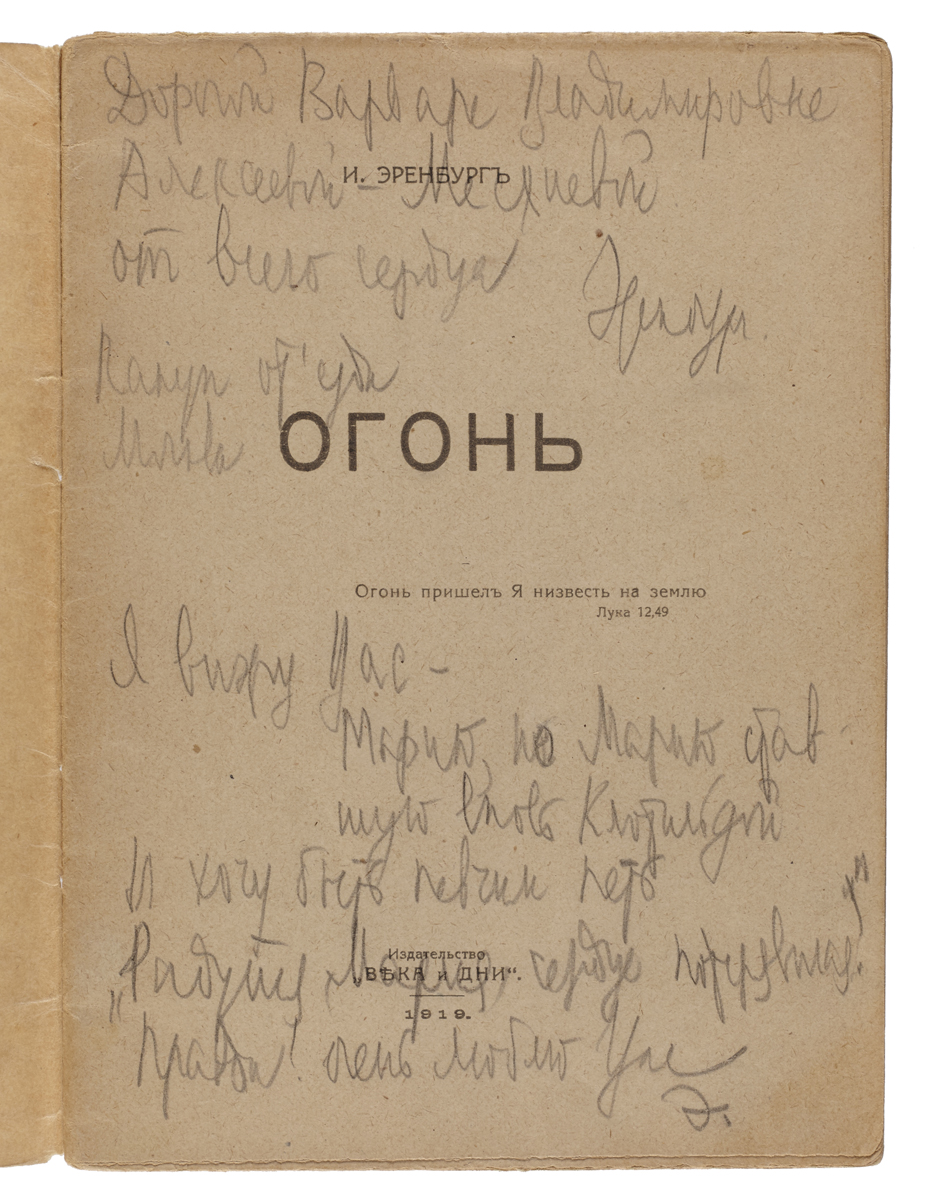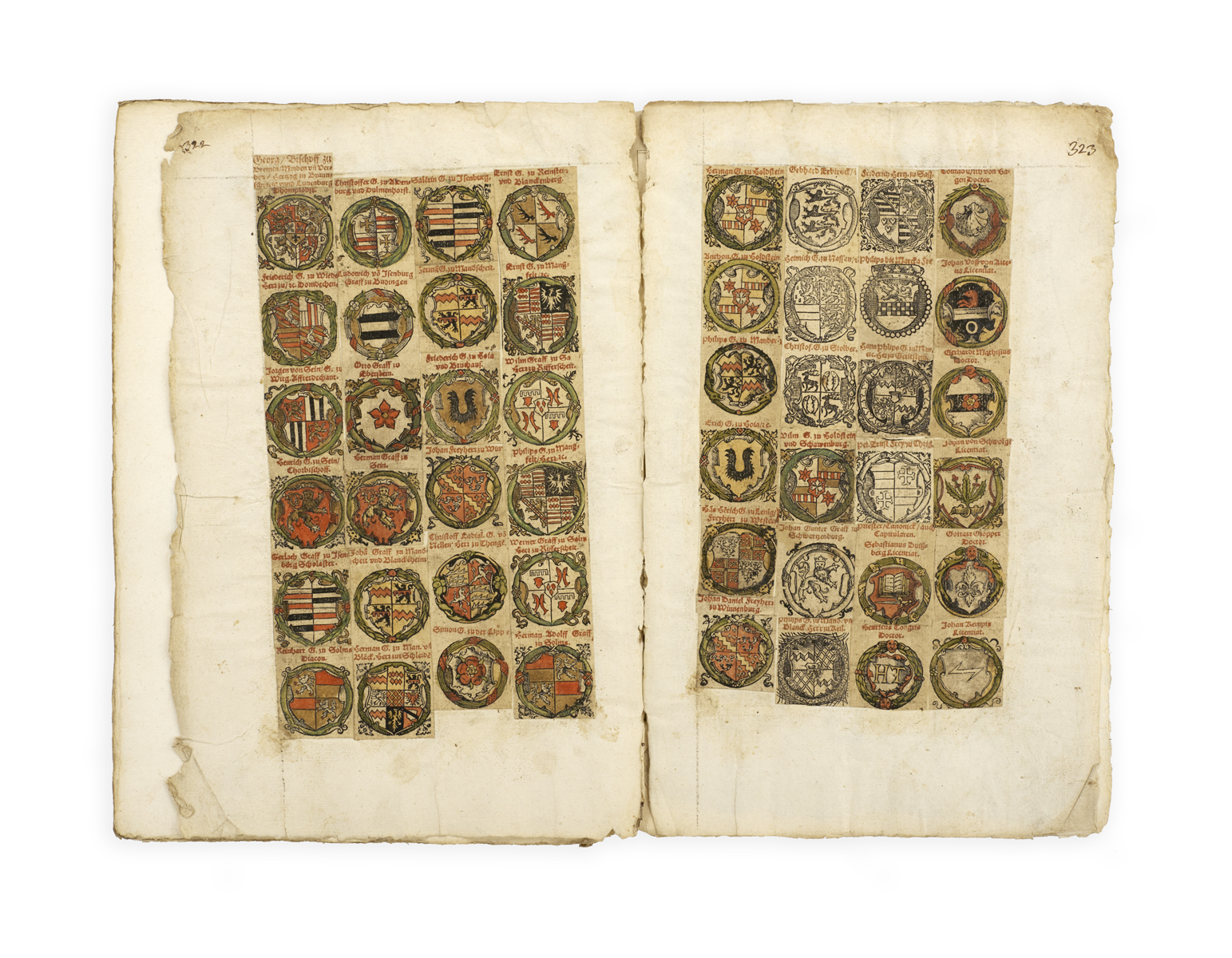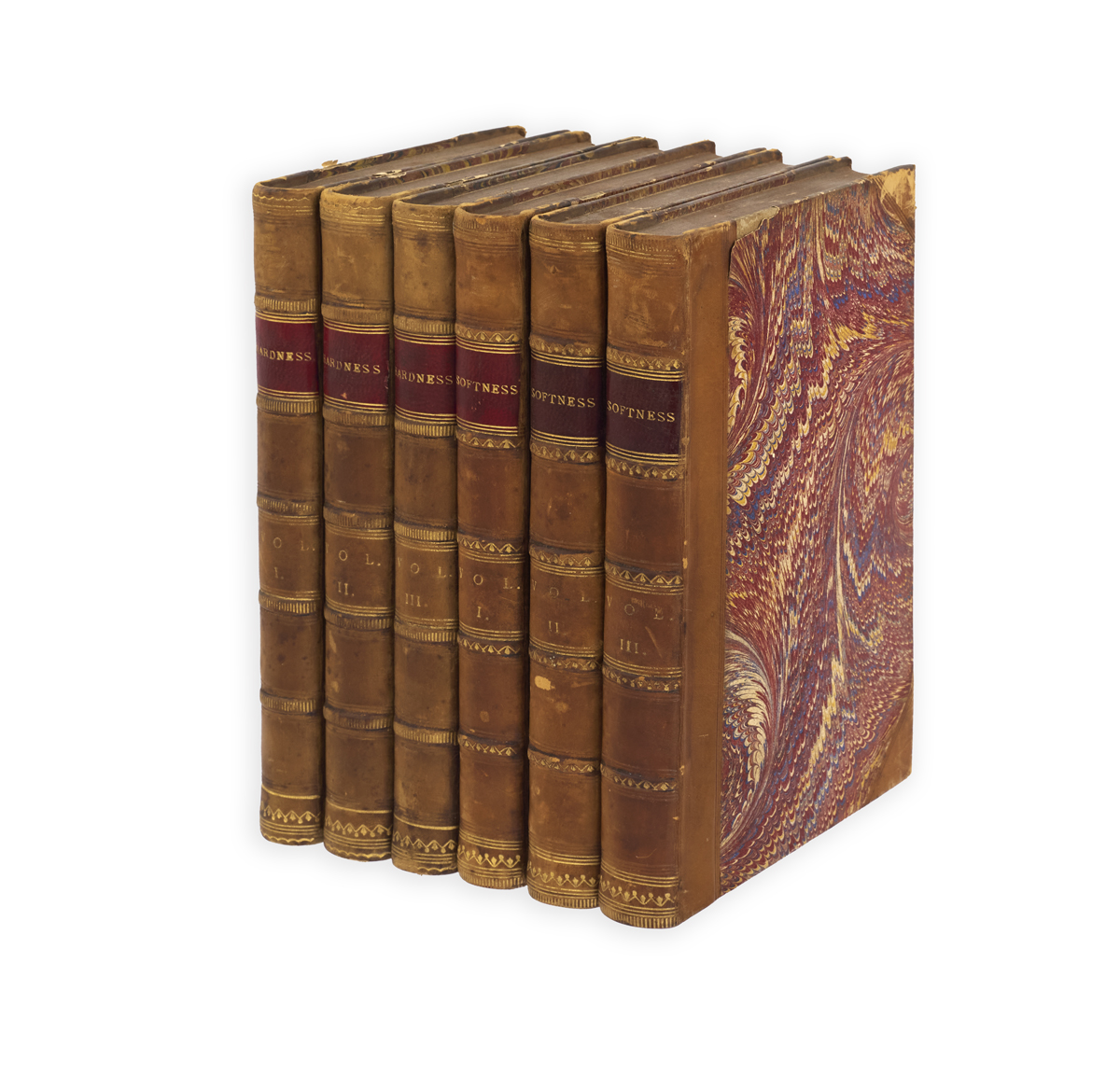
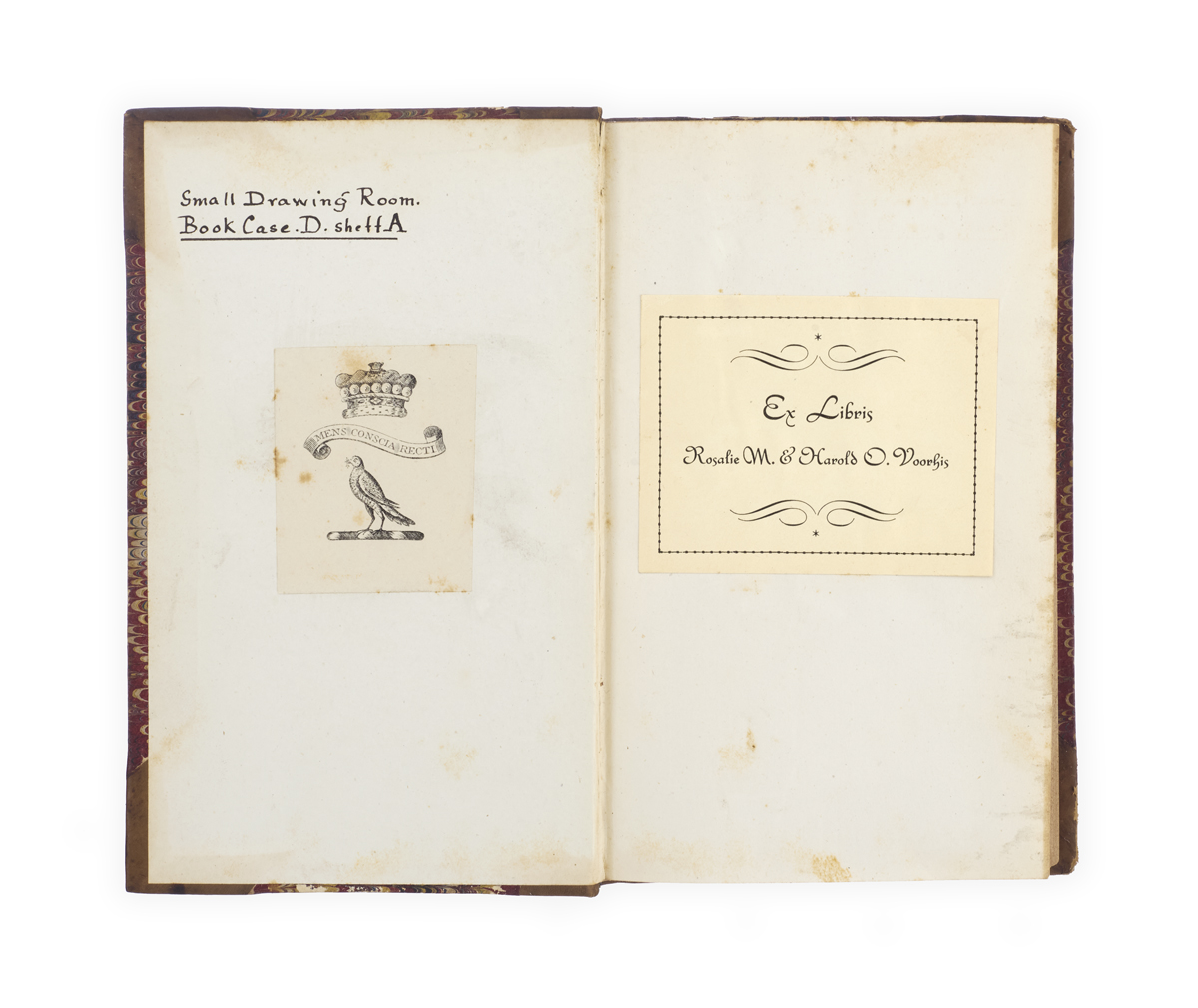
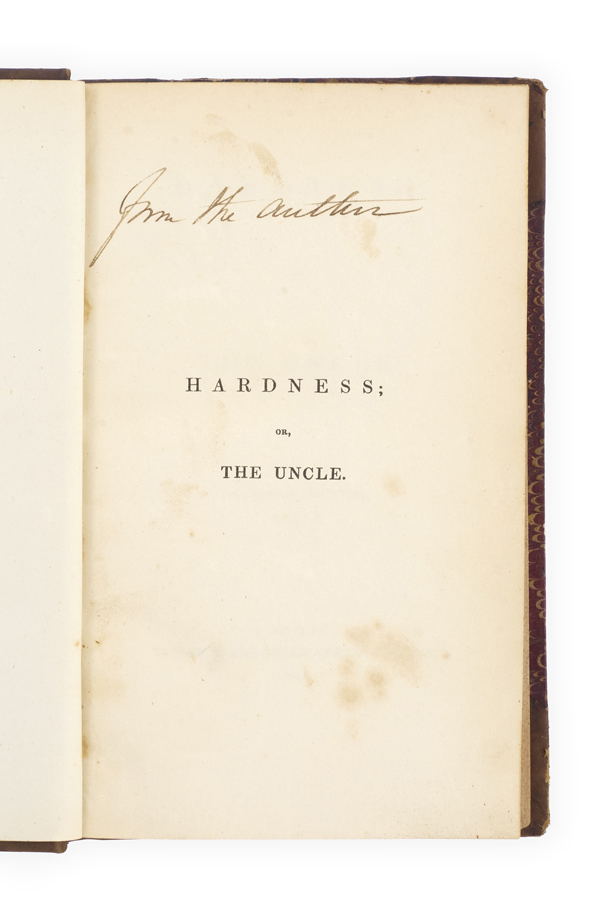
HOW TO WRITE A NOVEL
[KNOX, Charles Henry, Captain].
Hardness: or the Uncle. In Three Volumes...
London: Saunders and Otley … 1841.
[with:]
[KNOX, Charles Henry, Captain]. Softness a Novel. By the Author of “Hardness”. In three Volumes … London: Saunders and Otley … 1842.
Together six vols, 12mo, pp. [4], 312; [4], 336; [4], 312; and [4], 306; [4], 314; [4], 322; both with half-titles, the first in each inscribed ‘From the Author’; very good copies in uniform contemporary half calf and marbled boards; armorial bookplate of Viscount Ashbrook and a later bookplate in each volume.
First editions, scarce. The author, son of William Knox, Bishop of Killaloe and Kilfenora (later of Derry) and chaplain to the Irish House of Commons, joined the army in 1826, was made a captain in 1836, and retired on half-pay in 1838. After leaving the regular army he served as a Lieutenant-Colonel in the Royal Glamorgan Militia and embarked on a literary career, writing history, novels, and The Spirit of the Polka. In Hardness the vivid scenes of barrack and mess-room life, drawing on the author’s military career, are full of rough humour that we know we should deplore, but it is impossible not to laugh.
Hardness attracted long and favourable reviews in the Monthly Review, the Spectator, and the Metropolitan, and good but less enthusiastic reviews in the Athenæum and Tait’s Edinburgh Magazine, a remarkable reception for a first novel. This is a novel in which ‘London Life, Irish Life, Continental Life, and Provincial Life are all in turn laid under contribution’ (Athenæum).
Henry de Burgh, the son of the gallant General Sir Ulick de Burgh, might have followed in his father’s footsteps but there were no wars. Instead, comparatively wealthy, he engages in the life of a fashionable man of leisure – cards, horses, the opera, fine tailoring – until he runs through his fortune. His ‘hard’, aristocratic, and unpleasant uncle the Earl of Inismore refuses to help and he is forced to leave London. Living frugally in the country, he finds a worthy wife, which further annoys his uncle who had more lucrative plans for matchmaking. They are happy but very hard up. Henry is summoned to watch his uncle sign the will that is going to disinherit him. Flushed with rage at a clergyman who refuses to act as a witness, his uncle has a sudden heart attack and dies before signing, his pen already wet with ink.
At one point Henry contemplates earning a living by authorship, and a friend gives him a 6-page memorandum on ‘The Composition of a fashionable Novel’: ‘Love scenes 120 pages. Pastoral ditto 15 pages. One dinner, with bill of fare, and a side dish upset 1 page’, and so forth. There should be about 200 phrases in French and 100 in Italian. Of the 1000 pages only 120 are ‘male’ pages, the remaining 880 are ‘female’ pages, ‘which is the reason of the great success of lady writers now … it is women and children [who] read, so the book must be full of love and dress.’ They must have loved this at Saunders and Otley, if indeed they didn’t help.
In Softness Sir Thomas Champion, a young English gentleman of a quiet disposition, is cajoled by friends into ‘seeing life’. Despite hating the sea he buys a yacht and is shipwrecked. He is nervous on the box but is forced into driving four-in-hand and kills a poor girl in Kensington. Thus passes his early life until he develops a will of his own. With a will comes a wife, and in the end he fulfils his natural potential as a valuable member of society. There is an unusually large cast of other characters.
The recipient, presumably, of these presentation copies was Henry Jeffery Flower, 4th Viscount Ashbrook in the Irish peerage, a friend of George IV. Knox’s grandfather, Viscount Northland, had also been an Irish peer.
Library Hub and OCLC record 8 copies of Hardness but only four of Softness (BL, Bodley, Cambridge, NLS).
